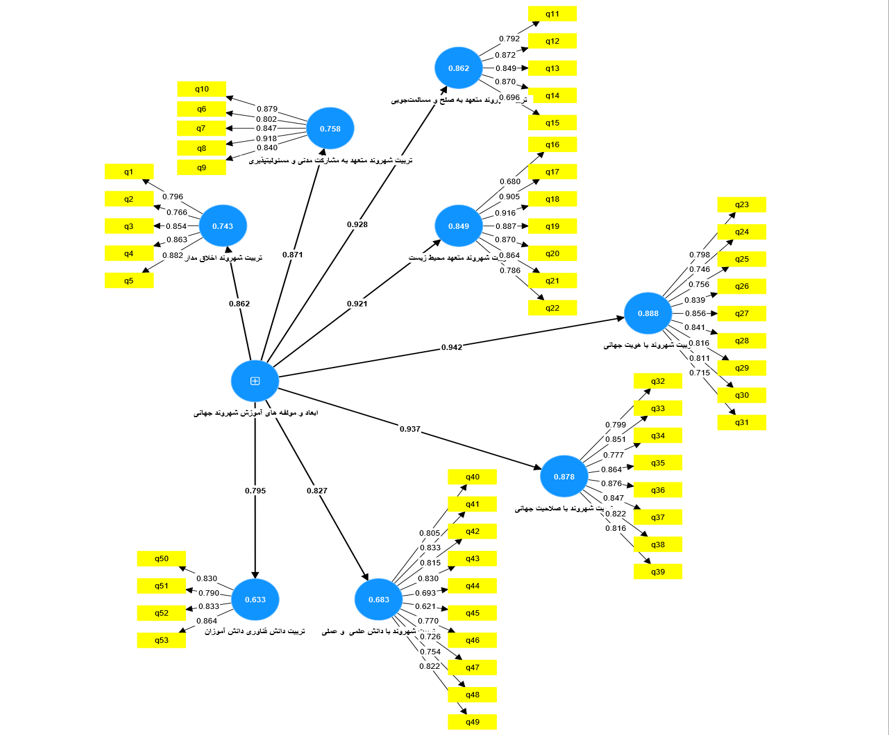Identifying Dimensions and Components of Global Citizenship Education in First-Year Secondary Schools Using Thematic Analysis
Keywords:
first secondary schools, education, global city, global citizen educationAbstract
The primary aim of this study is to identify the dimensions and components of global citizenship education in first-year secondary schools using the thematic analysis technique. The research method is mixed (qualitative-quantitative). In addition to document analysis, the study employs thematic analysis using MAXQDA12 software to identify factors and components. The statistical population includes all faculty members with assistant professor rank or higher in the fields of educational management, higher education management, and educational technology, as well as principals and teachers of first-year secondary schools. Theoretical saturation was achieved after conducting 14 interviews. Ultimately, basic, organizing, and overarching themes were extracted. In the quantitative phase, structural equation modeling was used to determine the impact and rank of dimensions and components. Based on the semi-structured interviews, eight dimensions (ethical citizenship education, education for civic engagement and responsibility, education for peace and reconciliation, environmental citizenship education, education for global identity, education for global competence, education for scientific and practical knowledge, and student technology literacy) and 53 components (organizing themes) for global citizenship education in first-year secondary schools were identified. Subsequently, a researcher-developed questionnaire revealed the following ranking of priorities: education for global identity (coefficient = 0.942), education for global competence (coefficient = 0.937), education for peace and reconciliation (coefficient = 0.928), environmental citizenship education (coefficient = 0.921), education for civic engagement and responsibility (coefficient = 0.871), ethical citizenship education (coefficient = 0.862), education for scientific and practical knowledge (coefficient = 0.827), and student technology literacy (coefficient = 0.795).
Downloads
References
Zarei Z, Nikdel M. Content Analysis of Iranian Elementary Social Studies Textbooks (Second Level) in terms of
Attention to Global Citizen Features. Research in Social Studies Education. 2021;3(2):59-82.
Baker W, Fang F. 'So maybe I'ma global citizen': developing intercultural citizenship in English medium education.
Language, Culture and Curriculum. 2021;34(1):1-17. doi: 10.1080/07908318.2020.1748045.
Qaltash A, Salehi M, Mirzaei H. Content Analysis of Iranian Elementary Social Studies Curriculum in terms of
Attention to Global Citizen Features. Research in Curriculum Planning (Knowledge and Research in Educational Sciences -
Curriculum Planning). 2012;9(35):117-31.
Poursalim A, Arafi M, Fathi Vajargah K. Exploring Curriculum Elements for Global Citizenship Education in the
Elementary Level of Iran's Educational System: A Qualitative Study. Research in Curriculum Planning. 2019;16(60):36-54.
Coelho DP, Caramelo J, Menezes I. Global citizenship and the global citizen/consumer: Perspectives from
practitioners in development NGOs in Portugal. Education, Citizenship and Social Justice. 2021:216-37. doi:
1177/1746197921999639.
Tale-Pasand S, Keshavarz Y, Fatemi Nasab ZS. Validation of the Global Citizenship Attitude Scale among Students
at Semnan University. Research and Planning in Higher Education. 2017;23(4):97-120.
Rashidi Z. Globalization and the Necessity of Public Education for Global Citizenship Training. Higher Education
Letter. 2017;10(38):103-28.
Jafari S. Identification and Validation of Components for Global Citizenship Education According to Experts: A
Mixed-Method Study. Journal of Education and Learning Studies. 2019;11(2):153-74.
Booth J. Becoming a global citizen? Developing community-facing learning in the social sciences. Learning and
Teaching. 2021;14(1):60-88. doi: 10.3167/latiss.2021.140104.
Albanesi C, Prati G, Guarino A, Cicognani E. School citizenship education through YPAR: What works? A mixedmethods study in Italy. Journal of Adolescent Research. 2023;38(1):143-77. doi: 10.1177/07435584211035564.
Spero TA. Global citizenship education as bounded self-formation in contemporary higher education
internationalisation projects. Globalisation, Societies and Education. 2021:1-16. doi: 10.1080/14767724.2021.1896999.
Estellés M, Fischman GE. Who needs global citizenship education? A review of the literature on teacher education.
Journal of Teacher Education. 2021;72(2):223-36. doi: 10.1177/0022487120920254.
Aboagye E. 10 Global Citizenship Education: Institutional Journeys to Socially Engaged Students in Canada. Global
Citizenship Education: University of Toronto Press; 2021. p. 253-74.
Kafshchian Moghadam A, Maleki H, Sadeghi A. Designing a Citizenship Rights Curriculum Model for the Second
Period of Elementary Education. Iranian Journal of Educational Sociology. 2024;7(2):1-7. doi: 10.61838/kman.ijes.7.2.1.
Muetterties CC. What kind of global citizen? A framework for best practices in world history civic education.
Education, Citizenship and Social Justice. 2021. doi: 10.1177/17461979211038502.
Rashidi Z. Designing and Explaining the Pattern of A Global Citizen Curriculum in Iranian Higher Education;
Interdisciplinary Approach. Research in Curriculum Planning. 2021;17(67):52-71.
Khaedir M, Wahab AA, editors. The Function of Multicultural Education in Growing Global Citizen. Atlantis Press;
Keshavarz Y, Amin Beidokhti AA. Designing and Testing a Model for Global Citizenship Education in Iran's
Educational System. New Educational Thoughts. 2022;17(1):113-36.
Khani B, Ahmadi A, Bagheri M. The Role of National Identity and Cultural Capital in Promoting Global Citizenship
Education. New Perspectives in Human Geography Quarterly. 2021;13(2):774-85.
Leite S. Using the SDGs for global citizenship education: Definitions, challenges, and opportunities. Globalisation,
Societies and Education. 2022;20(3):401-13. doi: 10.1080/14767724.2021.1882957.

Downloads
Published
Submitted
Revised
Accepted
Issue
Section
License
Copyright (c) 2024 Journal of Study and Innovation in Education and Development

This work is licensed under a Creative Commons Attribution-NonCommercial 4.0 International License.










